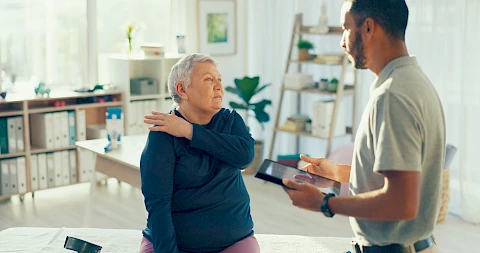
Do you ever notice that your joints tend to ache more when it's cold or rainy? Many seniors experience weather-related joint pain when the weather turns bad. Taking this into consideration, Senior Helpers offers information on the causes and ways to cope with discomfort, ultimately enhancing your overall quality of life.
The Science Behind Weather-Related Joint Pain
Many external changes can affect your joints in several ways. When the weather gets cold, it can make muscles and tissues stiffer, leading to increased pain and discomfort. Humid conditions can also contribute to swelling and inflammation in the joints, worsening existing pain for those with arthritis or other joint issues.
Types of Joint Pain Affected by the Elements
Temperature can influence different types of joint pain commonly experienced by older adults. For those with arthritis, lower atmospheric pressure and colder temperatures can increase inflammation and stiffness, making movement more painful. Joints weakened by previous injuries are often more sensitive to temperature and pressure changes, leading to immense discomfort during poor weather. Other conditions, such as tendonitis and bursitis, can also flare up due to weather changes, adding to the overall discomfort.
Managing Joint Pain in Cooler Weather
Although you can't control the elements, you can take steps to manage your physical aches effectively:
- Stay warm with cozy garments and heated blankets to relax muscles and reduce joint stiffness.
- Perform gentle exercises like stretching, yoga, taichi, and swimming to maintain joint flexibility and reduce pain. However, always consult your doctor before starting a new routine.
- Stay hydrated to keep joints lubricated by drinking plenty of water daily.
- Over-the-counter medications can offer temporary relief and also reduce pain.
- Wear supportive gear like braces and compression sleeves to stabilize joints, reduce pain, and add warmth.
Lifestyle Adjustments for Better Joint Health
Certain lifestyle adjustments can contribute to less joint pain and better overall health. A diet rich in anti-inflammatory foods like fruits, vegetables, and fish can help lessen joint pain. Consistent, low-impact exercise tailored for older adults can improve joint function and reduce pain. Practices like meditation, deep breathing, and even hobbies can help manage stress, improving how you perceive pain.
Get Support From Senior Helpers Corvallis
Understanding weather-related joint pain can help you take practical steps to manage your discomfort. By following our suggestions, you can minimize the impact of outside elements on your body.
If you need additional support, Senior Helpers Corvallis is here to provide personalized care and assistance in Molalla, Monmouth, Salem, Albany, and Lebanon. Contact us for help to maintain a comfortable and active lifestyle.